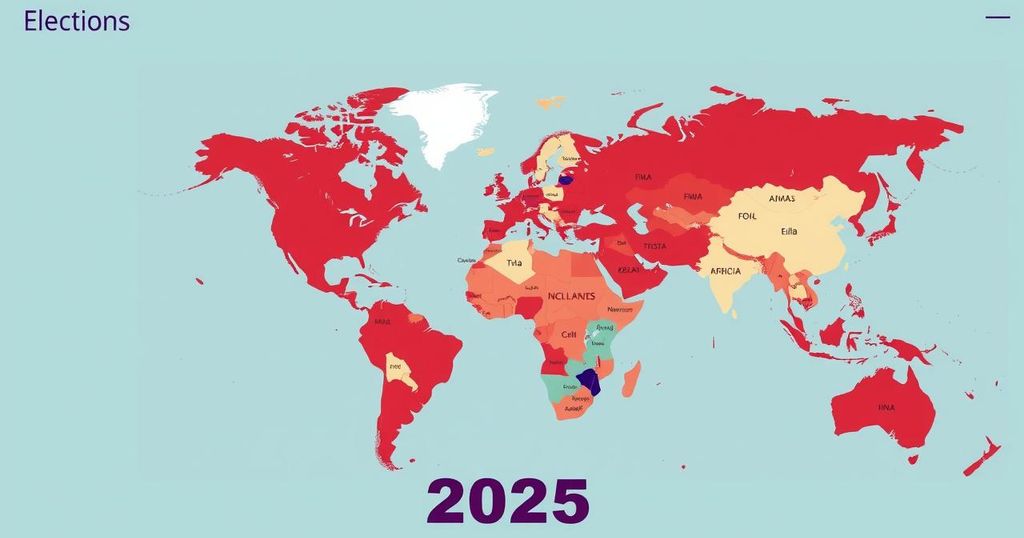As 2025 approaches, several pivotal elections are poised to reflect significant global trends, including inflation, populism, and geopolitical tensions. Expert insights detail the stakes for Belarus, Germany, the Philippines, Canada, and Chile, highlighting how these elections could redefine political power and national governance within the larger context of international relations.
As we approach 2025, multiple key elections are set to unfold globally, despite the anticipation of fewer electoral events compared to the previous year. Important topics such as inflation, the rise of populism, and geopolitical tensions from ongoing conflicts will heavily influence voter decisions. Experts from five countries—Canada, Germany, Chile, Belarus, and the Philippines—provide insights into the significant implications of their upcoming elections.
The election in Belarus on January 26, 2025, is expected to reaffirm Alexander Lukashenko’s long-standing rule with no credible opposition participating. The environment for democratic processes in Belarus remains suppressed, hindering fair elections and sustaining ongoing repression since the protests of 2020. This election could further entrench Belarus as an ally of Russia, continuing its support for military actions in Eastern Europe.
In Germany, an unexpected federal election will occur on February 23, 2025, following the collapse of the coalition government led by Chancellor Olaf Scholz. Faced with economic challenges and a fierce competition with right-wing parties, the election is seen as a crucial moment for German politics. Scholz’s poor approval ratings may unlikely contribute toward his sustainability in power, paving the way for a possible victory by the Christian Democratic Union leader, Friedrich Merz.
The Philippines will conduct an election on May 12, 2025, focusing on the Senate, which can be regarded as a reflection of President Ferdinand Marcos Jr.’s influence. The election results may consolidate or challenge his power dynamics, especially concerning his tumultuous relationship with Vice President Sara Duterte. Success in this election could bolster Marcos’s agenda, although potential ramifications may arise regarding Duterte’s political standing.
Canada is poised for an early federal election before the October 20, 2025 deadline, given Prime Minister Justin Trudeau’s crumbling coalition and declining approval ratings. With increasing pressure from opposition leader Pierre Poilievre and a populace frustrated by inflation, the forthcoming election may determine not only Trudeau’s fate but also the ideological future of Canada.
Chile’s presidential election is scheduled for November 16, 2025, amidst a contentious political landscape where public sentiment may lean towards the opposition due to President Gabriel Boric’s struggles to implement promised reforms. The outcome of this election will not only determine the next president but also reflect on the deeper political divisions stemming from recent constitutional rejections in the country.
These elections illustrate a period of critical decision-making for their respective nations, with potential repercussions extending far beyond national borders. Citizens will navigate complex realities marked by rising populism, economic hardships, and the struggle for democratic values. Each election, hence, signifies pivotal moments to address pressing challenges and redirect national trajectories toward or away from desired political ideals.
The article highlights five significant elections anticipated in 2025, detailing the political atmospheres and stakes involved in each nation. It emphasizes the interplay of factors such as economic conditions, social turmoil, and international relations shaping the electoral context. Additionally, it underscores the complexities facing various leaders and the implications of these elections, not merely for national governance but for larger geopolitical landscapes.
The elections of 2025, encompassing Belarus, Germany, the Philippines, Canada, and Chile, are pivotal for each nation as they confront pressing challenges shaped by economic, social, and political factors. These elections will not only test the resilience of current leaders but also reveal the electorate’s readiness to embrace change or maintain the status quo. Observing these dynamics will be crucial in understanding the future political landscapes in these countries and their potential influence on global affairs.
Original Source: www.ndtv.com






